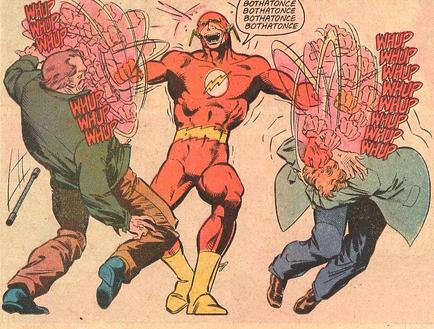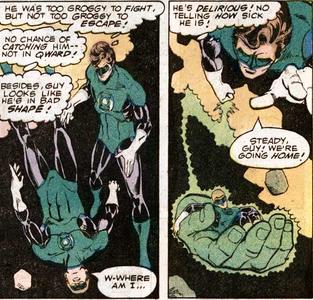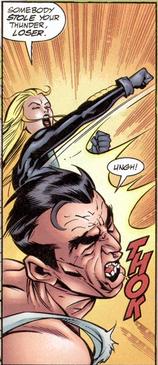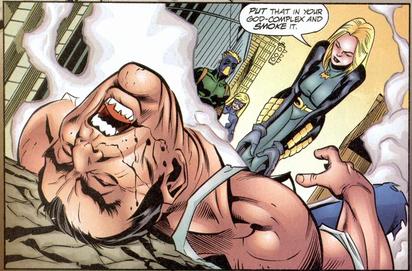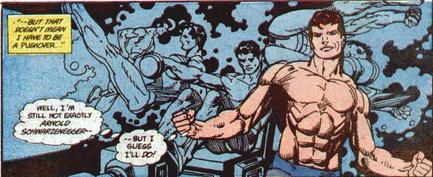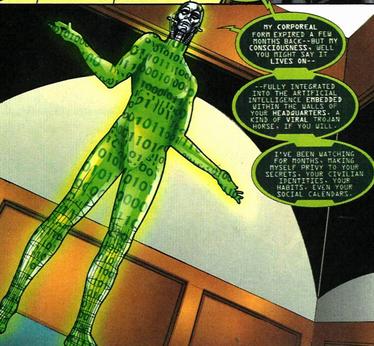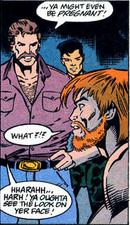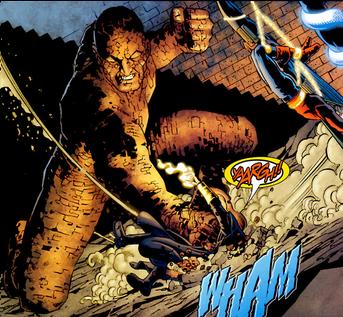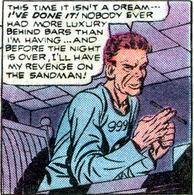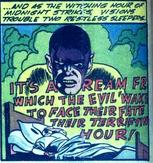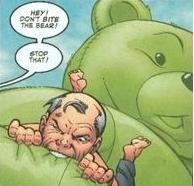You know, honestly, I kind of dislike Young Justice.
I didn't initially. The first time I read it, I adored it. Laughed my ass off. The jokes were clever and funny. The situations absurd but still cute. But when I read it again, when the jokes weren't new anymore, I started to find the series a bit harder to read. It's not that it was any less funny or that I disliked the characters, but each time I read it, looked deeper into the "coming of age" theme, I found it more and more distasteful.
This really isn't meant to be a criticism of Peter David's work, since I do think he's talented, though not always to my taste. It's more of an element of personal connection. I always felt, reading Young Justice, that it read very strongly of an adults attempt to write about (then) contemporary adolescence. And while I often like
that sort of story. This one didn't work for me.
Now, I admit, I'm looking back at the series with an adult's eye myself, but I do remember my teenage years quite well. I was fifteen years old in 1998, when Young Justice hit the shelves, and I can tell you quite honestly, my teenaged self would have felt no connection with this comic.
Sure, it's got angst and maturing themes amidst the humor, but the angst was epic, and the themes were honestly not very subtle. As an adult, I appreciate Tim's speech to Secret toward the end, but at the same time, I don't see it as being something any teenager I know would ever say. It's the sort of wisdom that comes from adulthood and retrospect. And honestly, it reads preachy. As for the humor, well, I liked a good joke as much as anyone, but that glib style full of puns and cleverly crafted quips doesn't read true to life. No one's that quick with a comeback.
It just doesn't ring true emotionally for me. I can't connect to it.
In contrast, lately, with the revival of Wally West and my unexpected joy at seeing him again despite my general unfamiliarity with the Flash, I've been reading lots and lots of post-Crisis Flash comics. And while I prefer the Waid-and-after runs in terms of general quality, I have to say...Baron and Messner-Loebs's Flash runs do everything that Young Justice doesn't for me, in terms of a story about growing up.
Of course there's the obvious element. This is the beginning of the post-Crisis Flash comic, the first 61 issues. Thus you have the former Kid-Flash really trying to settle into his role as the Flash. A kid stepping up to take an adult role, without the support of parents or mentors, to sink or to swim. The Flash might be twenty years old by this point, but anyone who thinks adolescence stops at twenty has never been twenty.
It's more than that though. Sure his missteps along the way bring to mind teenage/college age embarrassments and screw-ups. But that's not really what makes the story connect emotionally.
Tina McGee does. The Flash getting involved with a married (though separated) woman should not have worked as well as it did. But really, who doesn't remember what it was like to fall in love with someone completely inappropriate? To find yourself carried away with the moment? Doing things you wouldn't normally do? Having doubts and recriminations when alone at night, which all pale next to the thought of being with that person?
Who doesn't remember something like this, with "she's married" replaced by the self-recrimination of your choice:
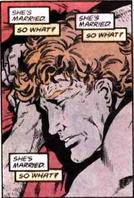
I don't know about anyone else, but I do.
Jerry McGee does, from Flash #17
"You're thinking '...Jesus, he's so old! He looks like a freak! Could she have left me for that?' And you feel like pounding on me and yelling at me and showing her how wrong she is...And you don't because you know it won't make any difference. And you don't even know for sure if you love her."
"How...do you know that?"
"I was twenty once."Tim Drake can make all the pretty speeches about mistakes that he wants, but if there's any speech that really sums up what it's like to be a teenager/young adult, it's Jerry McGee's right there. It's
confusing and it's
rough, and it makes no goddamn sense at all. And you kind of know it. You
know how it's supposed to be. But your hormones are raging and your mind is racing and everything's so new and raw. And even if we've never had the married woman we were sleeping with go back to her husband, that doesn't mean we can't recognize the truth in that sentiment.
I also very much appreciate that the speech was made by an adult. I have trouble buying that any teenager, even one as mature and cerebral as Tim Drake, could wax so eloquently on the subject. I genuinely believe that it takes a certain measure of time and distance to be able to evaluate one's own adolescence in that matter. A kid knows how he or she feels, sure, but putting it into calm relatable words like that? Well. I know I couldn't have and I don't think I know anyone who could.
Chunk does. I know I've been there. I've had those friends that I relied on so much that I tended to take for granted. The friends that I thought understood that I loved and appreciated so much that I would forget to say so. The friends I would neglect, not because I didn't care, but because school or work or family or boyfriend troubles were so big at the time that it would slip my mind. There would be hurt and justified anger all around and I had no idea, until whacked severely with a clue-bat figuratively speaking, what in the world I did wrong.
Mary West does. God, the guilt for neglecting parents with the simultaneous feeling of being smothered by them. Not to mention the realization that my parents had lives completely outside of being my parents. Skills and hobbies and dreams and desires that went completely over my head. And when do parents ever seem to get along with significant others? Even Rudolph West, while horrible to his son, is horrible in that very familiar way that bad parents can be. Harsh, mean, ill-tempered, and seeing his son more as a tool for his own ambitions. I was lucky in that my parents weren't like that, but it's not anunfamiliar concept either.
Piper does. That scene in which Piper comes out to Wally is great. As is Wally's reaction. He freaks and runs, but not so much out of disgust or horror. His reaction is a startled and incoherent sort of "But...why didn't I NOTICE?" And who hasn't had something like that happen? Maybe not a friend coming out of the closet, necessarily, but I think everyone's had a friend make some revelation that shakes us to our cores. That thing, whatever it is, that we should have seen. Should have noticed. Could be anything from "I'm anorexic" to "I'm in love with you." The signs were all there! Why didn't we see it?
Vandal Savage is the enemy Wally West faces in Flash #1. Who better to represent the evil machinations of adulthood? The Baron and Messner-Loebs runs are filled with instances of Wally's powers not working as they should. Whether exhausting him to the point of collapse, not working at all, or going crazy. That bears no resemblance to anything that happens in adolescence of course! Our bodies ALWAYS do what they're supposed to do! Honest!
Adolescence is HARD. Everything's confusing, you're seeing the world in a brand new way. You've got new responsibilities and everyone expects things from you. You're talked down to, disapproved of, and you know everyone ultimately thinks you're a giant jerk because of all the mistakes you've made. It doesn't get fixed with a joke or even a hug. It doesn't get fixed with a spirit monster's temper tantrum or a pretty speech from a boy in tights.
It just is.
